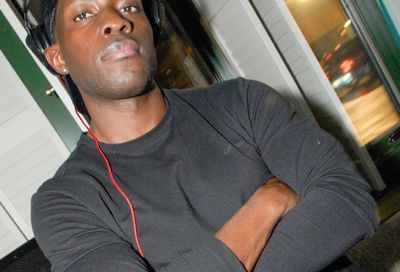LGBTQ students’ rights at issue in Fairfax School Board election
Transgender students' restroom use and LGBTQ inclusion in Family Life classes among more contentious election issues

Fairfax County voters are heading to the polls today to elect a new at-large school board member to fill the vacant seat left open by the resignation of Jeanette Hough — and LGBTQ student’s rights are a hot topic for voters.
Typically, school board races deal with budgetary issues and funding matters, but in recent cycles, school board races in one of the nation’s largest school systems have been dominated by social issues, including protections for LGBTQ students.
Less than two years ago, conservative activists and concerned parents attempted to stage a coup of the school board, in response to the their decision to expand Fairfax County Public Schools’ nondiscrimination policy to include protections for sexual orientation and gender identity.
Although the school board is technically nonpartisan, local county party organizations have often endorsed candidates they believe share their values. During the 2015 election, Republican-backed challengers to the mostly Democratic-backed board members made the issue of transgender restroom usage central to their campaigns, accusing the incumbent board members of trying to carry out a liberal political agenda.
Against that backdrop, Hough, running for one of three at-large seats, was the only GOP-backed candidate to oust a sitting incumbent.
This year’s election features Karen Keys-Gamarra, a former candidate for the Sully District on the school board who has been endorsed by the Fairfax County Democratic Committee; Chris Grisafe, a former candidate for county board of supervisors, who has been endorsed by the Fairfax County Republican Committee; Michael Owens; and Sandra Allen.
Despite the pronouncements made by some candidates in 2015, Fairfax’s approval of the nondiscrimination policies did not lead to a county-wide bathroom policy under which all students are allowed to use facilities matching their gender identity.
Rather, the decision of where students go to the restroom has been largely left up to individual schools, which are encouraged, but not required, by the school board to work with students and their parents on a case-by-case basis.
Last summer, former Superintendent Karen Garza published regulations about acceptance and social transition for transgender students, including proposed guidance dealing with names and pronouns, amending students’ school records to reflect their gender identity and any name changes, and access to locker rooms and restrooms.
However, the board, in a closed meeting, halted those regulations from taking effect. The expectation had been that the U.S. Supreme Court would hear and resolve the ongoing lawsuit by Gavin Grimm against the Gloucester County School Board, and determine whether refusing to treat transgender students according to their gender identity constitutes discrimination under Title IX. But Grimm’s case has since been sent back to lower courts, leaving individual school districts to carve out their own policies.
“What I’m hearing from kids and parents is there is this kind of murky, ‘we don’t know what’s going on’ situation, which can change from administrator to administrator. And that’s really untenable,” says Robert Rigby, the head of the pro-LGBTQ parent and teacher group FCPS Pride. “We at FCPS Pride are beginning an effort to reignite the debate over the regulations that were suspended last year. Our proposal to the board is to start a task force. But we’ll see what they do.”
Rigby concedes that FCPS Pride has preferred regulations they’d like to see implemented, but is willing to allow those proposals to be vetted by a task force.
“In general, what’s at stake in this election is equal treatment for LGBTQ people in Fairfax County Schools. What’s at stake, in particular, is welcome acceptance of transgender kids, and integration and acceptance of LGBTQ parents,” says Rigby, explaining his group’s decision to endorse Keys-Gamarra last month.

“What this means, depending on who gets elected, it means a vote — because Karen’s vote would be very different from Chris’s vote — and Karen has been very clear to us, and in public statements, that she supports regulations and social transitions for trans kids, and Chris has been clear that they should use single-stall bathrooms. And he will not commit, even to not rescinding the policy that was passed two years ago.”
Rigby says that another issue that has come up as the election approaches is the inclusion of LGBTQ-related matter in the Family Life Education (FLE) curriculum. Previously, parents could not opt to take their children out of FLE classes, but have since been allowed to exempt them in the same way they can “opt out” of sex education classes.
Under the current FLE curriculum, students in grades 7-9 briefly review definitions surrounding what it means to be “homosexual” or “bisexual” and defines what “gender identity.” But in-depth discussion of homosexuality or gender identity does not occur until grades 10-12.
There has been talk of including lessons that acknowledge the existence of same-sex parents as one of many different “family structures” in younger grades, but the school board has made no official proposal nor move to include those lessons at this time.

In an email exchange with Metro Weekly, Grisafe said that he prefers the current district policy of having administrators deal with parental requests for special accommodations for transgender students on a case-by-case basis.
He said he supports providing access to gender-neutral or single-stall restrooms for all students, including those who are transgender.
“I believe this is fundamentally an issue of privacy, and the privacy rights of all students matter, as well as the privacy rights of FCPS employees,” he wrote in the email. “While the Board decided to include transgender identity in Policy 1450, it has not yet determined how to implement the policy for not only bathrooms but also other issues including competitive sports. And, as we know, this issue is subject to ongoing litigation in the courts.
“It is incumbent upon all of us to be mindful and compassionate about respecting the identities of each and every student,” Grisafe told . “I support the continuance of the current approach to address transgender student matters with privacy and dignity on a case by case basis, and to ensure access to a private bathroom on that basis.”
With respect to the FLE curriculum, Grisafe would like to look at changing the current “opt out” model for FLE classes to allow parents to “opt in” model — a proposal that has previously been floated in public forums by socially conservative parents who are uncomfortable with mentioning homosexuality in schools. He says the board should have an “inclusive and transparent” discussion with parents and seriously take into account community input before adding LGBTQ-related material to FLE curriculum for elementary and middle school students.
Allen, one of two candidates running without official party backing, says she would seek feedback from parents, students, and advocates to make decisions regarding transgender issues.
“My position is all students have rights and they are entitled to have an equal education,” she says. “Schools should create a welcoming environment by removing labels, biases and stereotypical thinking. Faculty at all schools should set the example of inclusion.

“Decision makers must help create an environment that is welcoming and respectful, empowering the young to seek their own path. By empowering, I mean allowing each and every student to seek answers without fear, to ask questions without judgement, to seek excellence without limits.”
Owens says she “strongly supports” adding discussions of non-traditional families into the elementary-level FLE curriculum. With respect to bathrooms, she believes that all students, regardless of gender identity, should have access to single-stall restrooms, but that no group should be forced to use separate facilities.
“I believe that our children should use whatever bathroom or locker room they feel comfortable using,” Owens says. “Likewise, all of our students in FCPS should be addressed by the name or nickname and the pronoun they prefer and that preference should be indicated in their record. Addressing students — or adults, for that matter — in the way they have requested is common courtesy and should absolutely be FCPS policy.”
Regarding sports teams, Owens says she’d support assigning students to teams based on athletic ability, rather than by gender.
For competitive intramural sports, Fairfax County follows guidelines set forth by the Virginia High School League, which currently allows transgender children to compete on sports teams that match their gender identity. Presently, under VHSL guidelines, transgender children are not required to be taking hormones before they compete.
But Rigby notes that the current “case-by-case” approach isn’t sustainable, and severely disadvantages children whose parents are less savvy when dealing with school administrators.
“Who’s left in the lurch here are kids not of privilege, families who don’t know how to negotiate the ins and outs of dealing with school administrators, and kids who don’t have their parents coming in, avidly advocating for them,” he says. “We have a system that works moderately well for children of privilege, but some families just don’t know how to deal with the school. And that’s not written, but that’s how it ends up, for practical purposes.”
Polls in Fairfax County close at 7 p.m. on Tuesday, Aug. 29. To check your polling place, visit vote.elections.virginia.gov.
Support Metro Weekly’s Journalism
These are challenging times for news organizations. And yet it’s crucial we stay active and provide vital resources and information to both our local readers and the world. So won’t you please take a moment and consider supporting Metro Weekly with a membership? For as little as $5 a month, you can help ensure Metro Weekly magazine and MetroWeekly.com remain free, viable resources as we provide the best, most diverse, culturally-resonant LGBTQ coverage in both the D.C. region and around the world. Memberships come with exclusive perks and discounts, your own personal digital delivery of each week’s magazine (and an archive), access to our Member's Lounge when it launches this fall, and exclusive members-only items like Metro Weekly Membership Mugs and Tote Bags! Check out all our membership levels here and please join us today!
























